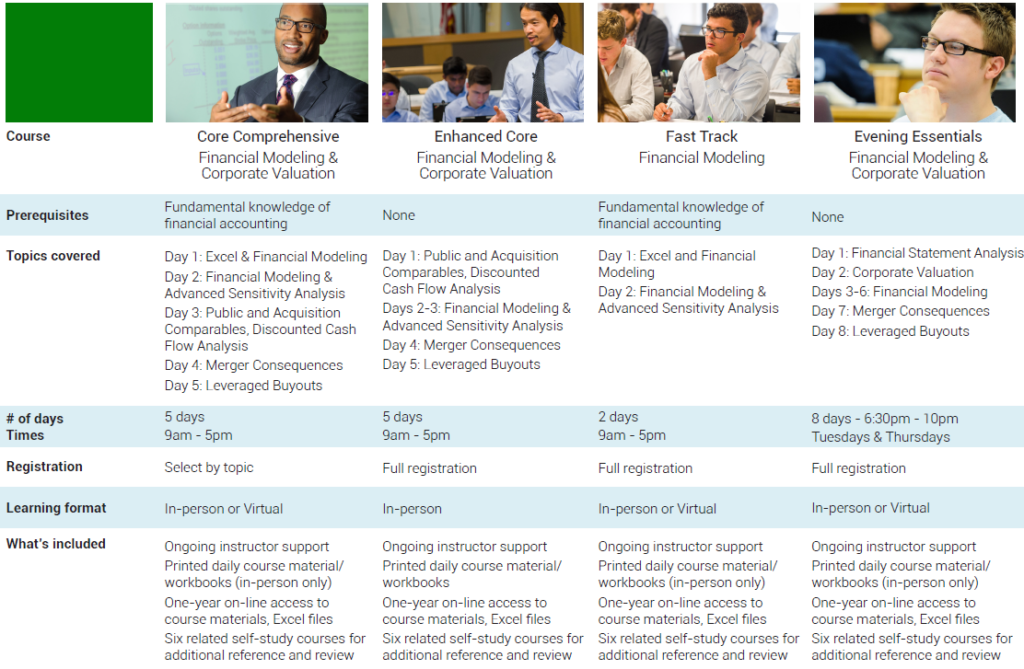How to ensure you and your team obtain essential finance skills
Financial training comes in all shapes and sizes so how does one decide which is the best option to obtain new functional finance skills? At Training The Street, we consider the knowledge and skills required to be a high-performing finance professional. In other words, what does it take to be “desk ready”? From this understanding of the desired outcome, we work to design and develop materials, tools, environment, and student experiences to ensure this outcome is achieved efficiently and consistently. So back to our question, how do you choose the right training option for your situation? We suggest considering the following:
- Do the learning objectives align with your needs?
- How are the learning objectives achieved? How is this impact measured?
- Are skills and confidence developed through experiential learning?
- Are tools provided to complement and reinforce the learning?
- Is there flexibility in the learning delivery format?
- Virtual
- In-Person
- On-demand
- Blended Solutions
- Are the instructors former bankers and finance professionals? Have they had the experience(s) to truly understand your perspective and situation?
- Is there a proven track record of success?
Functional financial training enables new hires to be better equipped to perform their role. This upfront investment in capability pays substantial dividends with respect to performance and efficiency, in addition to boosting employee morale. This impact on efficiency and productivity is realized across many industries and functional areas including:
- Sales & Trading
- Investment Banking
- Commercial Banking
- Capital Markets
- Asset Management
- Research
- Brokerage
- Finance
- Private Equity
- Corporate Development
- Consulting
- Tech & Ops
Financial courses benefit all individuals who are seeking a better understanding of traditional Wall Street methodologies for valuation, M&A, financial modeling and financial statements.
Who should attend financial training?
- Firms that need teams or individuals to get up to speed quickly
- New Hires
- Lateral Hires
- Off-cycle hires
- Financial services professionals (investment banking analysts or associates, consulting, research, asset management, private equity, brokerage, sales & trading, insurance, etc.)
- Corporate/strategic development or finance team members
- Individuals responsible for product or divisional budgets, projections, and profit/loss statements
- Those looking to enhance past learning in finance and financial statement analysis
Skills Needs Assessment
Whether you are training new hires, analysts, or seasoned finance professionals it is crucial to analyze the functional skills you would like to learn during your training, aka the learning outcome. At Training The Street we consider the level of proficiency required across the following competency domains:
- Accounting
- Asset Management
- Capital Markets
- Corporate Valuation
- Financial Modeling
- Functional Excel Skills
Financial Courses usually offer a syllabus of individual topics that are covered. However, as you compare course topics to your needs consider not just what is covered but how the learning is accomplished. Learning via experience, situations/case studies and repetition is where the magic happens. Make sure there is ample opportunity to practice, receive constructive feedback, and receive qualitative and quantitative feedback of learner progress.
For example, Training The Street’s Core Comprehensive course covers both Financial Modeling and core functional Excel skills throughout the course. Leveraging the flipped classroom pedagogy, student engagement and learning is enhanced via scenario-based problem solving, activities, and experiences facilitated by experienced instructors. Progress is tracked, feedback is given, and practice is encouraged until that aha moment arrives and the difficult just became easier.
Delivery Preferences
Flexible Learning Options – Virtual, In-Person, On-Demand
Financial Courses are often available in both in-person or virtual classroom formats. If you learn better in your own space or traveling isn’t convenient, virtual is a great solution especially when instructor-led. Some participants find in-person training provides for easier opportunities to interact with the instructor and get first-person help on your financial model or Excel needs. Both options are designed to achieve the same learning outcomes, regardless of the delivery method.
In addition to virtual and in-person formats, Training The Street provides all attendees Access to the TTS Academy. Our online Self-Study courses with over 10+ hours on Financial Modeling that you can review anytime and, on any device, to help reinforce the concepts you learn in class. You’ll also find additional topics in the Self-Study such as: Understanding and Controlling Circularity Errors, Troubleshooting, Sensitivity Analysis and Discounted Cash Flow Valuations.
Whether it is virtual or in-person, you will get the skills and support you need to succeed. The best thing to do is choose what works best for your learning style and schedule.
Choose your provider
At the end of the day, training is a means to achieving learning outcomes, behavior change and positive impact on individual and business performance. We’ve discussed the typical training considerations from our experience but strongly encourage you to place importance on impact and learning outcomes above all else. So, take the extra time to understand not only what is provided but how it will have a measurable impact on you and your team’s performance.
Why Choose Training The Street
Our established teaching reputation speaks for itself. With our seasoned instructors, real-world experience, and knowledge, we have a passion to deliver topics in an insightful way. This allows for discussions and exercises to come alive. The TTS teaching methodology isn’t to just teach the mechanics but to cultivate the next generation of finance professionals. Our experiential teaching platform of incorporating practical examples, active learning, and case-study based curriculum drives our mission to make you “desk ready”.
Browse all Training The Street Public Courses: here


